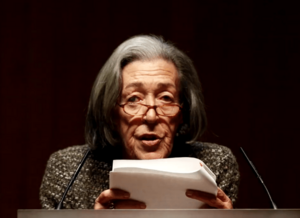Maria Velho da Costa facts for kids
Maria Velho da Costa (born June 26, 1938 – died May 23, 2020) was a famous Portuguese writer. She won the important Camões Prize in 2002 for her writing. Maria was part of the Portuguese Feminist Movement, which worked for women's rights.
She became well-known as one of the authors of the book Novas Cartas Portuguesas (New Portuguese Letters). She wrote it with Maria Teresa Horta and Maria Isabel Barreno. These three writers were called the "Three Marias." They were arrested and put on trial in 1972. This happened because of strict censorship laws during the Estado Novo dictatorship in Portugal. Their book and trial caused protests in Portugal. They also got attention from women's groups in Europe and America. This happened just before the Carnation Revolution in 1974.
Biography
Maria Velho da Costa was born in Lisbon, Portugal, on June 26, 1938. Her parents were Afonso Jaime de Bivar Moreira de Brito Velho da Costa and Julieta Vaz Monteiro da Assunção. Her father was an army officer who later worked in press censorship.
Maria studied languages and literature at the University of Lisbon. After finishing her studies, she worked as a secondary school teacher. She also became the president of the Portuguese Association of Writers. From 1980 to 1987, she was a university teacher at King's College London. There, she taught about Portuguese and Brazilian studies.
After the Carnation Revolution in 1974, Maria worked for the Government of Portugal. She helped with cultural projects. She was a cultural advisor in 1979. From 1988 to 1990, she worked in Cape Verde, promoting Portuguese culture. She also worked on projects celebrating Portuguese history and language. This included work for the Instituto Camões.
From 1975 onwards, Maria often helped write movie scripts. She worked with famous directors like João César Monteiro.
Maria was already a known writer by 1969 with her novel Maina Mendes. But she became much more famous because of the book Novas Cartas Portuguesas. This book openly protested against old-fashioned ideas about women. It was also against the Estado Novo government. Because of this book, she and her co-authors, the "Three Marias," faced a trial. The trial ended when the Carnation Revolution happened on April 25, 1974. This revolution stopped the punishments they were facing.
In her later books, Maria continued to write about women's rights. Her writing style was also very unique. She liked to challenge traditional ways of telling stories.
In 1962, Maria married Adérito de Oliveira Sedas Nunes in Lisbon. He was a well-known sociologist and a government minister. They had one son, João Afonso de Bivar Sedas Nunes, who also became a sociologist and university professor.
Maria Velho da Costa passed away on May 23, 2020, in Lisbon. She was 81 years old.
Awards and Honors
Maria Velho da Costa received many important awards for her writing:
- The Vergílio Ferreira Prize from the University of Évora in 1997. This was for all her collected works.
- The Camões Prize in 2002. This is one of the most important awards for Portuguese literature.
- The Correntes de Escritas Prize in 2008 for her novel Myra.
- The dstgroup Grand Prize in Literature in 2010, also for Myra.
She also received honors from the Government of Portugal:
- Grand Officer of the Order of Prince Henry (June 9, 2003).
- Grand Officer of the Order of Liberty (April 25, 2011).
In 2020, the Portuguese Society of Authors created a new award in her honor. It is called the Maria Velho Costa Prize in Literature. The first prize was given to Teresa Noronha in the same year.
See also
 In Spanish: Maria Velho da Costa para niños
In Spanish: Maria Velho da Costa para niños
- List of Portuguese writers
- Maria Teresa Horta
 | Precious Adams |
 | Lauren Anderson |
 | Janet Collins |


